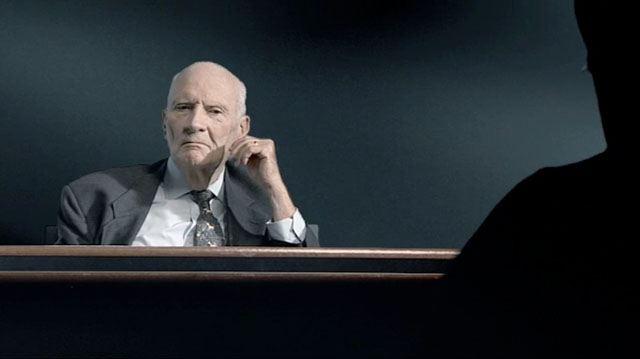On the day that an Israeli airstrike has killed the commander of the Hamas military wing in Gaza, Ra’anan Alexandrowicz‘s The Law in These Parts opens for a two-week run at Film Forum in New York.
“Taking cues from both Errol Morris and Harun Farocki,” writes Steve Macfarlane in Slant, this “riveting” documentary “begins contrite about its own inherent limitations. A set is constructed, a chair is positioned at a desk, and a green screen is lit up behind it, Alexandrowicz asserting over voiceover that the film’s reality begins and ends with what he decides to show, how he documents it. His interviewees are a handful of retired Israeli judges and legal experts, all ex-military. ‘Their work,’ he says, ‘remained behind the scenes of familiar historical events and, in my opinion, never received the exposure it deserved.'”
“These are the men who helped establish a parallel set of statutes for Palestinian citizens, ‘temporary’ laws that would allow for land to be seized and colonized, and for an Arabic suspect to be told that he must defend himself against crimes which are classified,” writes David Fear in Time Out New York. “That these gents must [explain themselves] while footage of West Bank injustices plays behind them lets you know exactly where Alexandrowicz’s sympathies fall before a single response has been issued, and that he’s not afraid to utilize a visual medium to make his points.”
“A document written years before the Six Day War’s outbreak is produced, outlining how the Israeli Defense Forces would be obeyed under an occupation,” explains Aaron Cutler at the L. “Once the war ended, over a million people became the IDF’s subjects overnight. The military established its own set of provisional laws separate from the Israeli government’s and left them open to change. The IDF set up its own courts, with three military-appointed judges deciding each case; proceedings were always to be held in Hebrew, with a soldier translating into Arabic if needed. The judges condoned the settlement of Israeli citizens within occupied areas, justifying it with laws established by the Ottoman Empire, and decided the punishments of Palestinians accused of resisting.”
Jonathan Robbins for Film Comment: “There is no shortage of European-funded Israeli documentaries making the festival and art-house rounds and angrily putting Israel’s occupation of the West Bank under the microscope, but The Law in These Parts stands out as a paragon.”
“His subjects may contort themselves, but Mr. Alexandrowicz doesn’t have to,” writes Rachel Saltz in the New York Times. “His film makes a persuasive argument: When law is an alibi for power instead of a constraint on it, law has been emptied of all meaning.”
Update: Michael Tully at Hammer to Nail: “For fear of re-stoking my own inner rage, it doesn’t seem like a good idea to recount any of the film’s more eye-opening examples of just how and where the Israeli political system tipped the scales from ‘questionable’ into unlawful in the past five decades. But just listening to these judges and lawyers confirm that there are indeed two rules of law used to govern the same territory—one for their country’s citizens and the other for their ‘held’ occupants—okay, see, I have to stop now, because writing that concrete fact, which no one can dispute, makes me want to stop typing and start making fists again.”
Update, 11/15: “As the UN Security Council meets in an emergency session and rockets fire from the Gaza Strip, killing Israelis in retaliation, Alexandrowicz’s compelling documentary explores how we got into this mess in the first place,” writes Anthony Kaufman.
“As a documentarian, Alexandrowicz is sympathetic to how people take positions first and justify them later, but he still gets these judges to admit that politicians punted the issue of how to handle the Palestinians to the courts, who deferred to the military rather than operating independently.” A “B” from Noel Murray at the AV Club.
Steve Erickson talks with Alexandrowicz for Filmmaker.
Update, 11/16: “In confronting the Israeli law of occupation with evidence of its tragic consequences,” writes Davin Reich at Cinespect, “the film not only levels a devastating indictment, but also reveals how such a legal framework sustains itself by subjugating even its supporters, making victims of all. As The Law in These Parts ends and the lights come up, director Ra’anan Alexandrowicz’s appeal to the viewers-as-jurors lingers.”
For news and tips throughout the day every day, follow @KeyframeDaily on Twitter and/or the RSS feed. Get Keyframe Daily in your inbox by signing in at fandor.com/daily.




